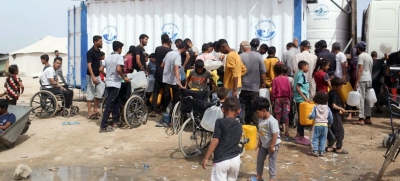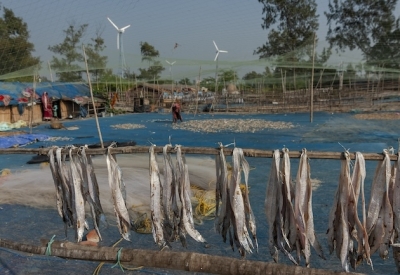PESHAWAR, PAKISTAN, Aug 18 (IPS) — Torrential monsoon rains have left the people, especially women, in crisis as they are still grappling to recover from the last year’s floods in Pakistan.
“We are yet to return to normal lives after devastation caused by severe rains in June 2002 when the new series of rains have started only to further aggravate our problems,” Jannat Bibi, a resident of Kalam in the Swat Valley, told IPS.
Bibi, 44, a housewife, along with co-villagers, must walk about a kilometre twice a day to collect drinking water for her 10-member family. She says they want the government to provide them with essential needs like food, water, shelter, and medication.
“A new ongoing wave of monsoon rains has left us high and dry as we are facing a host of ailments due to contaminated water.”
“Some non-governmental organisations have given us mineral water, utensils and foodstuff last year in June when torrential rain damaged our mud-built houses, but this year, there’s nobody to extend us a helping hand despite severe floods,” she says.
Most people in the neighbourhood fear that more rain would bring more misery for them as the people have yet to rebuild their homes while roads and health facilities were in shambles.
Dr Farooq Khan in Swat district says the people desperately require clean drinking water as cases of diarrhoea have been increasing among them.
“There are more cases of vector-borne diseases, such as malaria, dengue, haemorrhagic fever (DHF) and Leishmaniasis because the people are exposed to mosquitoes-bites, the transmitters of these diseases, due to pools of stagnant water which serves as breeding grounds for mosquitoes,” Khan said.
Power breakdowns create problems because people cannot get drinking water from wells, and they often store it in uncovered pots, which serve as breeding spots for mosquitoes. “Khyber Pakhtunkhwa recorded 18,000 dengue Haemorrhagic fever patients and 18 deaths in 2022,” he said.
National Disaster Management Authority says at least 86 people, including eight children, have been killed by floods and landslides triggered by monsoon rains that have lashed Pakistan since last month. In June 2022, a flood killed 289 people, it says.
“Women are the worst victim of climatic changes as they stay home and have to prepare food, wash clothes and look after children, therefore, we need to focus on their welfare,” Dr Javid Khan, a local physician in Malakand district, which is adjacent to Swat, says.
According to him, about 20 cholera cases have been recorded because people use water contaminated by sewerage pipes during floods.
“The World Health Organization is establishing two diarrhoea treatment centres to prevent outbreaks of food and water-borne diseases,” he said.
Munir Ahmed, a local environmentalist, says that women, representing about half of the country’s population, are the worst affected by torrential rains.
Last year, massive flooding affected nearly two-thirds of the country’s population in Pakistan, as it submerged the low-lying areas inhabited by poor people, he says.
Rains destroyed 1.7 million homes in Sindh, Punjab, Balochistan, and Khyber Pakhtunkhwa provinces which also damaged the water sources and cultivable land, he says.
“As the people were recovering from the past year’s devastation caused by flood, a new spell has started dampening their hopes of recovery,” Ahmed says.
More than 1 300 health facilities and 3 000 schools destroyed by 2022’s floods are yet to be built.
“More than 50 000 pregnant women are finding it hard to undergo mandatory checkups at hospitals because of bad roads and lack of transportation in the country,” according to the Ministry of Health. It says the government is providing alternate sources in the shape of mobile vehicles to ensure their home-based clinical examinations.
Jabina Bibi, of the remote Chitral district, waited in stayed at home despite being six months into her pregnancy and didn’t receive a medical checkup until a local NGO sent a team to her locality, and she managed to source iron tablets for the treatment of severe malnourishment.
“The NGO’s doctors proved a blessing for me, and I delivered a normal baby because they carried out an ultrasound which enabled me to know the date of delivery for which I was taken to the hospital located 50 km away,” she said.
Other women also benefited, but the facilities are scarce, she said.
Chitral experienced more floods in July this year, which killed at least ten people. Water-Aid, and non-profit organisation, says that the floods have left almost 700 000 pregnant women in the country without getting maternal healthcare, leaving them and their newborns without support, food, security, and basic medical care. The miscarriage rate also skyrocketed during this period.
Floods causing landslides also resulted in the displacement of people and the loss of millions of livestock.
In Mansehra district, extensive damage rendered many roads unusable, creating significant transportation difficulties.
“We need to find work because construction activities have stopped, and it’s extremely to travel to other districts to find jobs,” Mushtaq Ahmed, 24, a resident of Mansehra, said. Pakistan is the second country with the most melting glaciers due to global warming, and Mansehra is one of the affected districts.
Climate experts believe that women and children are at a much higher risk of losing their lives during a disaster due to their limited access to resources during emergencies. The situation regarding monsoon rains has been under control as of now, but there are forecasts of potential rains in the coming days, which can hammer the last nail in the coffin of those madly hit by rainwaters last year.
Climate change brings, in its wake, deprivation of people from food security, health, education, and jobs, besides exposing women to violence, displacement, and mental health issues, and the government needs to protect the people from the ill effects of floods, experts say.
IPS UN Bureau Report






